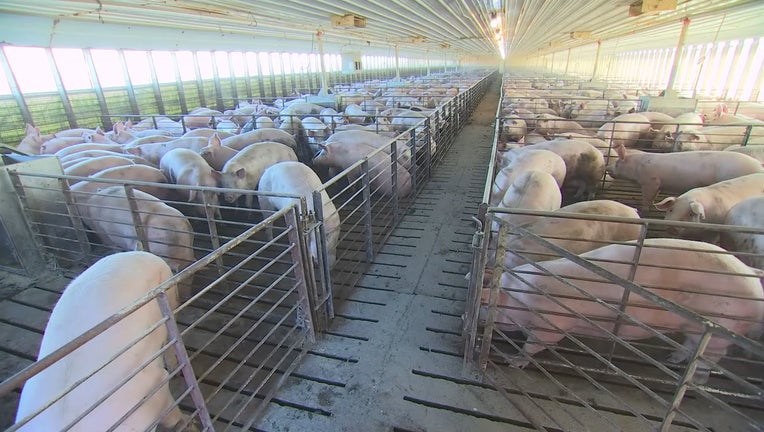Supply chain troubles may lead to mass slaughter of hogs

(FOX 9)
KENYON, Minn. (FOX 9) - The U.S. food supply chain may be the most reliable in human history - until something goes wrong.
And for Mike Patterson, a hog farmer near Kenyon in Goodhue County, things are going very wrong very quickly.
“The whole system is really built for on-time delivery of the animal to the plant, then to processing, and from processing to the grocery store. Any one piece gets out of wack and there can be real problems,” said Patterson.
Things started going wrong Easter Sunday, when he got an email that the processing plant where he sends his pigs, Smithfield in Sioux Falls, was closing down because of COVID-19. Since then, more than 800 workers at Smithfield have become sick.
On Monday, JBS in Worthington, Minnesota’s largest pork processor, closed indefinitely.
Processing plants have been falling like dominos ever since.
Comfrey Farm in Windom is closed. So is Tyson in Iowa. Then, Patterson’s back-up facility, Farmland in Illinois, shut down Friday.
About 30 percent of the pork processing capacity in the U.S. is now idle. In the Upper Midwest, only Hormel and Quality Pork in Austin are still open.
“We’ve got perfectly good pork on the hoof we just have to get it into grocery stores,” said Patterson.
A ‘Humongous’ Waste
Many of the Patterson Farm’s 3,000 pigs should’ve had their last meal sometime last week, and they are quickly running out of room in the barn.
Patterson put his pigs on a high fiber diet, what he calls ‘salad for pigs,’ because overcrowding can become an issue for the health and welfare of the animal.
It also affects the bottom line. Fatter pigs are sold at a severe discount because they don’t properly fit the machinery at processing facilities.
A pig that might be worth $125 at slaughter, if it gains just 15 lbs., could be worth only $40. In two weeks, pigs can gain 30 to 40 lbs.
“In less than three weeks I’ve got hogs from my nursery coming into my facility, and they have no place to go,” said Patterson, who said he may be forced to euthanize his animals.
According to the Minnesota Pork Association, 3,000 pigs were destroyed last week, and another 200,000 could be put down in the next few weeks if the processing plants don’t open soon.
“As a farmer, that’s very tough on me,” said Patterson. “We do everything we can to keep those hogs healthy and having to euthanize them is humongous waste."
Facilities Like Petri Dishes
The conditions at processing facilities, with workers shoulder to shoulder, may have turned the plants into Petri dishes.
“You don’t have six feet between people in these processing plants,” said Professor Michael Boland of the Food Industry Center at the University of Minnesota.
The coronavirus pandemic has illustrated how dependent the food supply chain is on processing facilities that rely heavily on immigrant labor.
Forty different languages are spoken at Smithfield and JBS, and the Centers for Disease Control (CDC) has said language may have been a barrier in protecting workers.
Minnesota health officials have said the virus may have spread among employees and family members who work at more than one processing facility.
“If you’ve got the majority of employees that can’t come to the plant because they’re sick, where are they going to find people?” asked Boland.
Farmers Facing ‘Extinction’
Hog prices for farmers have fallen 39 percent since the pandemic started. But, consumer prices for pork and bacon have only gone up. And experts predict we may be just a couple weeks away from shortages of pork and bacon at the supermarket.
Congressman Jim Hagedorn (R-Minnesota) said he believes COVID-19 is now a serious threat to the food supply chain.
“Our system is so efficient, but if something goes a little haywire, even for a short period of time, it shows it’s very fragile,” said Hagedorn.
Hagedorn predicts farmers will likely need another $40 billion in assistance before the pandemic is over, and some kind of long-term risk management program. If not, he fears, only the biggest hog operations will survive.
“They were doing okay and now they’re facing extinction, so we have to help them out,” said Hagedorn.
The irony is beginning last year, Minnesota pork producers were afraid of a virus from China. It just wasn’t COVID-19.
African Swine Fever has decimated half the herd in China, and American producers feared the virus would make it to the U.S.
“There are diseases in hogs that spread rapidly,” said Rebekah Patterson. “So, we are probably more aware of disease than a lot of people in the general public.”


